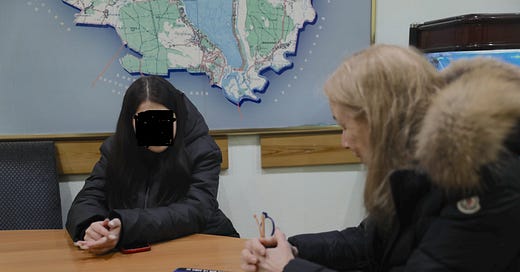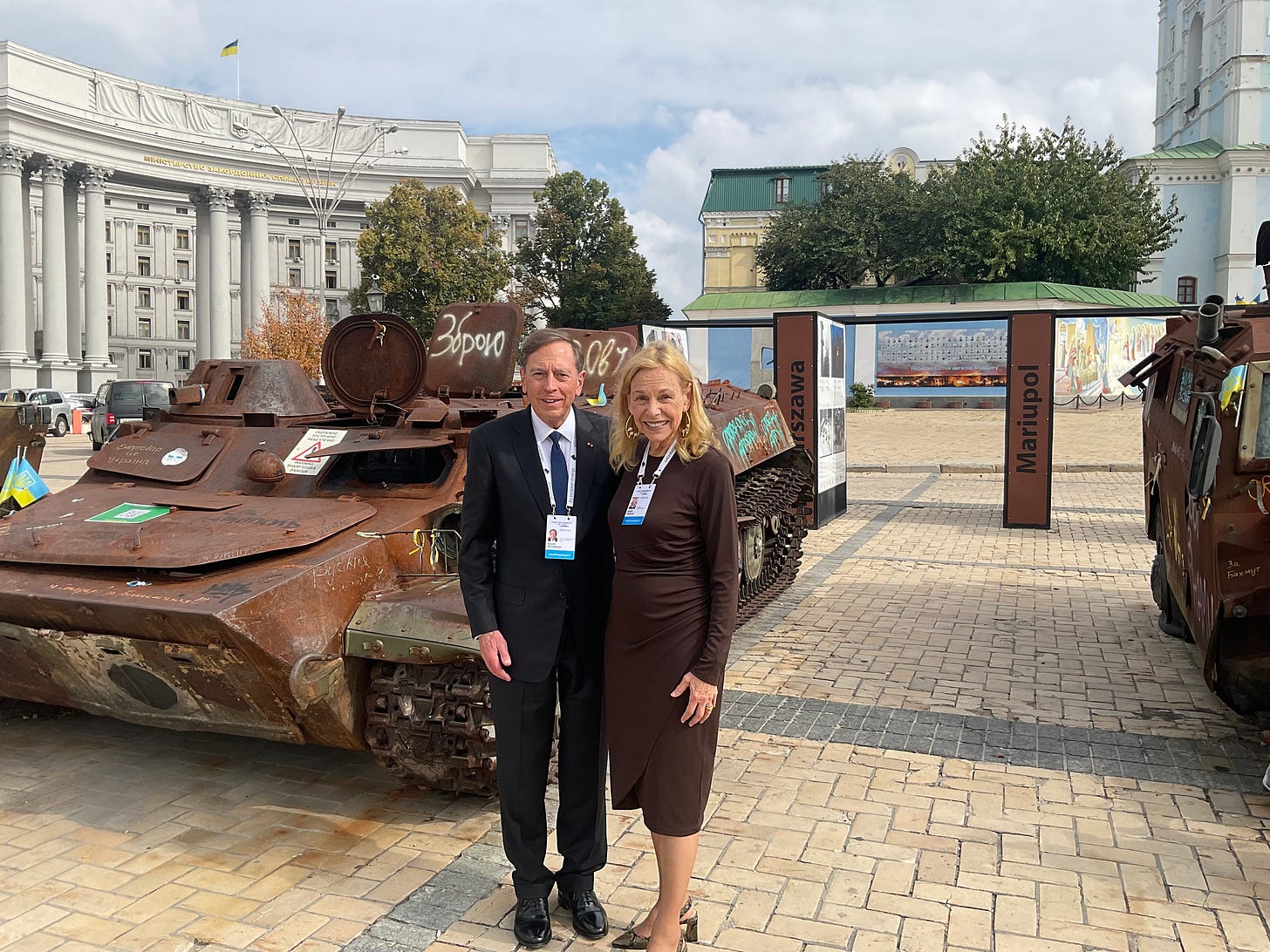Ukraine's Mental Health Crisis & AI Solutions
MT799 Authenticated | Independent Contributors Column
Dear Subscribers,
Welcome to MT799 Authenticated, Barbershop Whispers….Russia's (BWR) independent contributors column is published on Wednesdays from time to time. The independent contributors are seasoned experts in Russian geopolitics, domestic politics, and business.
The views of MT799 contributors are their views and not necessarily the opinions of BWR or e8Q Technologies LLC.
Publisher’s Note:
Many BWR subscribers have contacted me and expressed an interest in the mental health impact of Putin’s war on Ukrainians and how this issue is being addressed. Putin’s war on Ukraine will have a lasting negative impact on Ukraine’s economy and its people for decades to come. The mental health of its people will be critical to Ukraine’s economic recovery.
In response to these subscriber requests, I’ve invited world-renowned entrepreneur, journalist, and war correspondent Mitzi Perdue to write about her experience in Ukraine on this subject.
About the Author:
Mitzi Perdue is an accomplished entrepreneur, war correspondent, nationally recognized syndicated columnist, and international activist. Most recently, she has dedicated her time and money toward the mental healthcare needs of innocent Ukrainian wartime victims suffering from severe Post-Traumatic Stress Disorder (PSTD) as a result of Putin’s unprovoked war against Ukraine.

She has held leadership roles with American Agri-Women, the National Commission on Libraries and Information Science, and broadcasted thousands of radio programs on topics ranging from farming to mental health.
She currently writes for the Association of Foreign Press Correspondents and Psychology Today. Her work has appeared in the Wall Street Journal, the Washington Examiner, the Epoch Times, and USA Today.
Mitzi holds a bachelor of arts degree, with honors, from Harvard University and a master's degree from George Washington University.
You can find more about Mitzi’s work on her website and learn more about “Mental Health Global.”
Ukraine's Mental Health Crisis & AI Solutions
Fourteen-year-old Darya Bondarenko witnessed Russian soldiers in Bucha as they aimed their machine guns at her father and stepmother and then riddled their bodies with bullets. Her father died instantly, and minutes later, her mother bled out as she watched.
This is about as traumatic as could happen to a young girl. I happened to learn her story because, as a war correspondent this year, I was in a police station near Kyiv, and she was one of dozens of war crimes victims who came to the station to tell me, a Western journalist, what they had endured.

When she was telling me about her unimaginably horrible experience, I couldn’t help noticing that her voice was a monotone. Often, during our half hour together, she’d refer to the absolute horror that had witnessed her as if it had happened to someone else.
I write for Psychology Today, and although I’m no psychologist, I hang out with psychologists, and even I could tell the Darya was disassociating. She spoke as if she were detached from herself.
The prognosis for a person who is disassociating is, in the absence of counseling, they’ll typically self-medicate with drugs or alcohol. They may end up with a whole new set of problems that may damage and shorten their lives.
When I asked the police translator, Irina Tkach if Darya would be getting the counseling she so clearly needed, Tkach answered,
“Unfortunately, millions of individuals here have endured similarly difficult situations. This is happening on such a scale that the chances of counseling for her are slim. She’s on her own.”
Darya’s situation haunted me, and I began to do some research. I found that according to Ukrainian government estimates, as many as 15 million individuals in Ukraine have mental health conditions severe enough to interfere with their ability to work or maintain close relationships. According to the Georgetown University Collaborative on Global Children’s Issues,
Russia’s war on Ukraine is having devastating impacts on children and families. More than 7 million children are affected, having experienced violence, loss of family members, displacement, and disrupted education.
To put this number into perspective, Ukraine has a population of 37M. This translates into a crisis that will have repercussions across generations of Ukrainians and the economy for decades to come.

In the course of writing about war crimes—my specialty as a war correspondent—I've met individuals who are enduring insomnia, panic attacks, depression, anxiety, and a host of other debilitating mental health conditions. In many cases, these mental health problems require lifetime treatment, often in warzones with limited resources.
The problem in Ukraine today is that the number of mental health professionals available to help these individuals is only the tiniest fraction of the number that’s needed. Frankly, it’s hard to get exact figures on the number of mental health therapists in Ukraine, but you can hear estimates of 11 per 100,000 people. In the US, the comparable figure is 267 per 100,000.
If the figures are accurate, the Ukrainians’ have approximately 1/25th the number of therapists than the United States. Ukraine, a country that’s three years into a brutal war, has a desperate need for a new approach to helping the millions of individuals for whom, as of now, the mental health support is not there at the scale needed to match the need.
As someone who wrote her master’s thesis on the future of computers, I started wondering if using an artificial intelligence (AI) driven Large Language Model (LLM) like ChatGPT could help people in need of mental health support. I mentioned the idea to a tech entrepreneur from Texas, Clara Kaluderovic, and she mentioned it to General David Petraeus.
The three of us agreed that an LLM AI-driven mental healthcare platform had the potential to help individuals who otherwise might get no help. That was the beginning of Mental Help Global.
What is Mental Help Global (MHG)?
The non-profit Mental Help Global, we formed aims to provide additional mental health support to Ukrainians 24/7 at no cost to them. We use a ChatGPT-type AI tool with Retrieval-Augmented Generation (RAG) in an LLM to help bridge the gap between the number of mental health professionals and the needs of the Ukrainian people.
We are making heavy use of RAG, which combines the capabilities of an AI-driven LLM with real-time access to databases relevant to Ukraine. Our project uses the most relevant and up-to-date information from trusted sources (e.g., clinical guidelines, therapeutic exercises, etc) before generating a response. When someone in Ukraine seeks support, the AI platform will pull tailored mental health advice or coping strategies from resources that Ukrainian professionals have vetted and updated to reflect local needs and cultural sensitivities. For example, it might access information specifically related to trauma or PTSD management in a war-torn context, ensuring the support is accurate and relevant.
Our RAG-enabled system will be able to handle thousands and, eventually, hundreds of thousands of interactions simultaneously, providing support to a vast number of users 24/7. Currently, the American University of Kyiv has hired eminent mental health specialists along with information technology specialists, and they now have a $40,000 server for the initial pilot. We hope to launch in January of 2025.
Mental Help Global does not aim to replace professional therapy. However, it can serve as an accessible first point of support, offering psychoeducation, self-help strategies, and crisis intervention techniques that align with Ukrainian professional standards. It could also guide users on when and how to seek in-person professional help.
We’re rolling it out slowly, with small demo groups, starting early in 2025. We’ll have users rate their sessions so we’ll have feedback from them, plus knowledgeable Ukrainian therapists will be monitoring the interactions.
Academic Benefit
The effort will be housed at the American University Kyiv, but we’re coordinating with other universities such as Harvard, Stanford, and the University of Arizona. While providing services, we’re building a big data component with the expectations that this data will drive academic research and articles about, for example, the impact of AI on the economics of mental health.
Mental Help Global (MHG) aims to address the immense mental health crisis that exists in Ukraine today, and we’re doing it by leveraging advanced AI technology and expert collaboration. With the severe shortage of mental health professionals, MHG's AI platform, enriched with culturally relevant and up-to-date information, offers scalable support to millions of Ukrainians in need. While it does not replace traditional therapy, MHG will serve as a critical first line of support, providing essential guidance, psychoeducation, and crisis intervention.
Vol 2, No 60 - BWR (MT799) 18.10.2024
Thank you for reading “Barbershop Whispers....Russia” written by Adam A Blanco! “Barbershop Whispers…Russia” is a product of e8Q Technologies, a consultancy with insights on all things Eurasia. Subscribe for free to receive new posts.







Does Mental Help Global have a website?
I'm wondering how many Ukranians even have access to a computer or cell phone to engage this AI tool ?